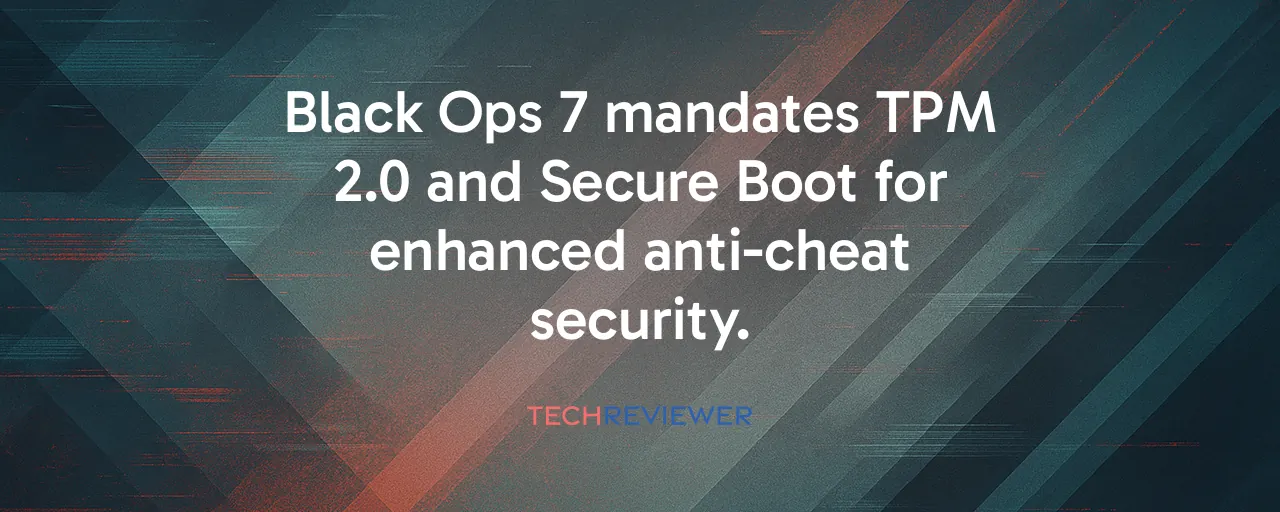A New Standard for PC Gaming
When Call of Duty: Black Ops 7 hits PC, PlayStation, and Xbox on November 14, 2025, it brings more than explosive gameplay. Its PC specifications, detailed by Activision, mark a turning point for the industry. From mandatory security features to support for handheld devices like the Steam Deck, these requirements reflect bigger shifts in how games are built and played. Players face a choice: upgrade their rigs or adapt to a new reality where security and versatility redefine performance expectations.
The specs cater to everyone, from budget gamers running older Ryzen 5 1400 processors to esports pros chasing 4K glory with NVIDIA's RTX 4080. Developer Beenox provides extensive graphics customization options, letting players tweak settings for smooth frame rates or stunning visuals. This balance of accessibility and cutting-edge tech sets the stage for a deeper look at what these requirements mean for the future.
Security Locks Out Cheats
A standout feature of Black Ops 7's specs is the requirement for TPM 2.0 and Secure Boot across all PC setups. These hardware security measures, integrated into the Ricochet Anti-Cheat system, verify system integrity before the game even starts. For competitive players, this is a win, as it blocks rootkits and other cheats that plague online matches, ensuring fair play in high-stakes esports matches.
However, this security comes with trade-offs. Some players, especially those with older PCs built before 2018, may lack TPM 2.0 support. Navigating BIOS to enable Secure Boot can also feel daunting for less tech-savvy users. While over 90% of PCs from 2018 onward support these features, those with custom or outdated rigs might need costly upgrades, raising questions about accessibility versus fairness.
Handhelds Join the AAA Party
Black Ops 7's support for handheld PCs like the Steam Deck, ROG Ally, and Legion Go signals a bold step for portable gaming. Beenox optimized the game with sharper text and smart power management for smaller screens, making it playable on the go. With Steam Deck holding a 3% share of Steam's platform by October 2025, this move taps into a growing market of players who game during commutes or travel.
Compare this to the Steam Deck's success with other AAA titles, where optimized controls and visuals have turned handhelds into legitimate platforms. Unlike older mobile gaming, which leaned on simplified apps, today's handhelds tackle complex titles like Black Ops 7. The lesson? Developers now see portable devices as equals to desktops, expanding where and how players engage with blockbuster games.
The Upgrade Dilemma
For players with older PCs, Black Ops 7's specs pose a challenge. The minimum requirement, like an AMD Ryzen 5 1400 or Intel Core i5-6600, supports decade-old hardware, but the 116 GB SSD storage demand and TPM 2.0 mandate push some systems out. Players with budget rigs may face forced upgrades, especially with SSD costs adding up for those juggling multiple AAA titles.
Contrast this with the Competitive/4K tier, which targets newer GPUs like the AMD Radeon RX 7900 XT. These specs align with the latest hardware trends, encouraging enthusiasts to invest in cutting-edge tech for crisp visuals. The takeaway is clear: while Black Ops 7 welcomes diverse setups, its demands highlight a growing divide between accessible gaming and the push for next-gen performance.
